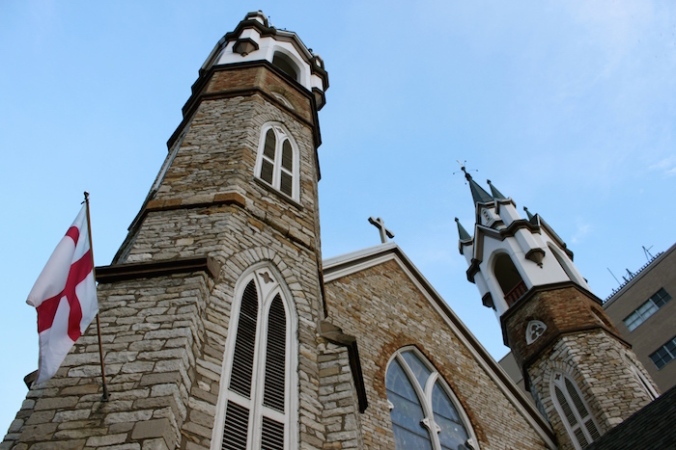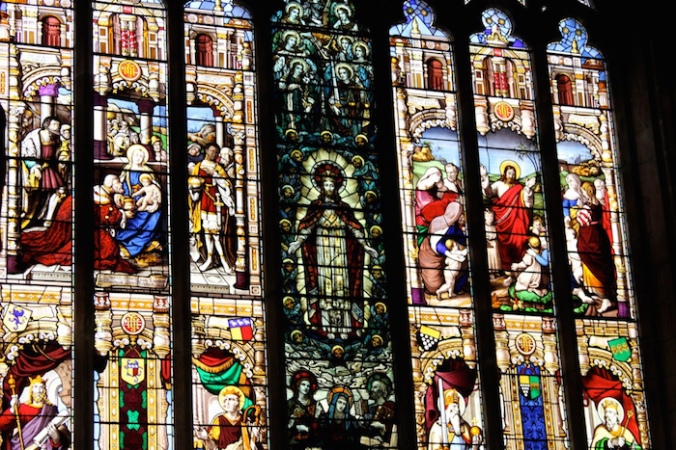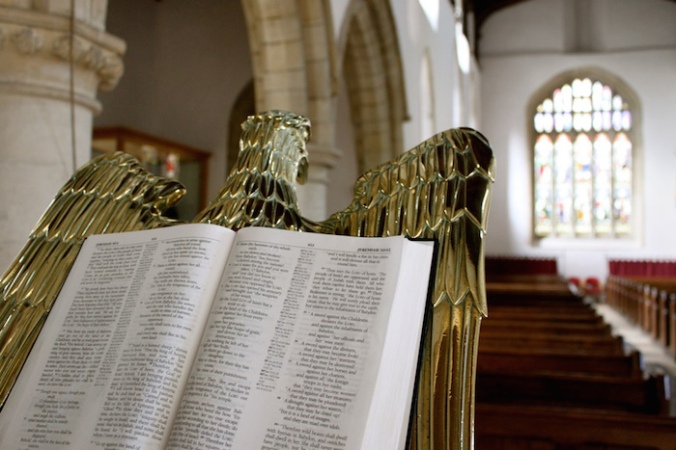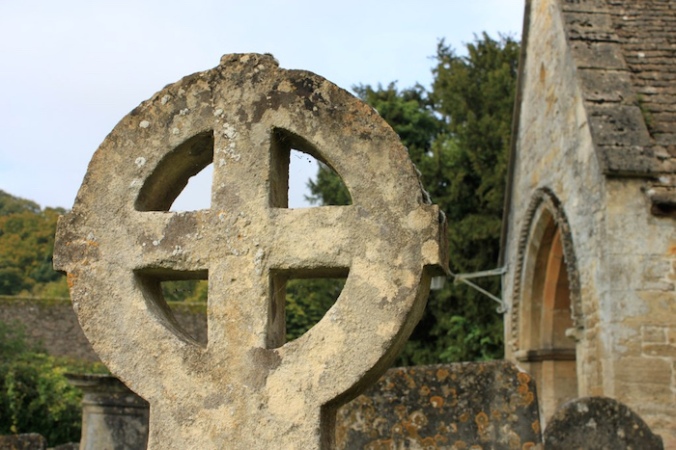My faith was saved in a gutted-out shopping mall.
I had reached a point where I no longer believed in God’s love—or rather, I didn’t believe it was meant for me. I thought it was something reserved for God’s “chosen ones,” and I just couldn’t imagine myself as one of the lucky few.
It was a trendy church with a famous pastor and a hip worship band that helped me reassemble the pieces of my faith. I will always be thankful for that church.
At that time, I had no idea my journey would lead from that gutted-out shopping mall to an old red door. But it did. Today it’s the Eucharist, the stained glass windows, and the liturgies of the
Episcopal Church that are breathing new life into my faith.
I’m not alone, either. Lately I’ve been sifting through the stories of fellow travelers like
Rachel Held Evans,
Jonathan Martin, and
Lindsey Harts. We’ve all found something meaningful in the Episcopal Church, something disorienting and comforting all at once, something that feels vaguely like… home.
That’s not a term disaffected evangelicals like me are quick to use. But that’s what the Episcopal Church has become for me: a new spiritual home. Here are some of the reasons for that…
1. The way the liturgy soaks into your being.
The first few times I walked through those big red doors, I didn’t know the code. I didn’t know when to sit or stand. I didn’t know how to use the prayer book. I didn’t know how to cross myself.
While others have sought to make Christianity as accessible as possible, the liturgy of the Episcopal Church feels other, like a strange artifact calling us into a different and slightly foreign reality. Learning the liturgy was like learning a new language.
These days, I’m having to rely less on the prayer book. After months (and now years) of repetition, the words and movements come more naturally from within. Rachel Held Evans described it
like this:
At first, the liturgy of the Episcopal Church captured me with its novelty… But we’ve been showing up for nearly six months now, and so it is a different sort of beauty I encounter on Sunday mornings these days—the beauty of familiarity, of sweet routine. I know the order of service now. I know it well enough to have favorite parts, to skim ahead when I’m hungry or restless, to get the songs stuck in my head.
We are products of a culture that demands everything is new and fresh. We frown on repetition and ritual. But these ancient patterns have a way of soaking into your bones. The prayers and songs stay with me throughout the week in a way no sermon ever has.
2. The way the liturgy invites me to worship with my whole being, bridging the false divide between body and soul.
Genuflecting in the aisle. Crossing yourself. Kneeling. Episcopalians worship not just with their hearts or their voices but with their bodies.
Not that it didn’t take some getting used to. It was a few years before I could bring myself to make the sign of the cross. Now I appreciate it for what is: a prayer. It just happens to be one you pray with your body.
And why not? God made us whole persons. We are not disembodied souls stuffed into human shells. We should worship with our whole being. Our heart and soul and flesh should cry out together,
as the Psalmist wrote.
It should be said we’re not the only ones who embrace the notion of embodied worship, and our way is not the only way to do so. Pentecostals practice embodied worship when they lift their hands in praise or dance in the aisles. Whole-person worship, as I’ve learned from the Episcopal Church, can be faith-deepening. That’s because, as
Elisabeth Grunert once commented, “We learn with our bodies.”
3. The way it anchors my faith when no act of will on my part can.
I don’t always believe the words of the Nicene Creed. But I say them anyway. Sometimes they’re more a confession of desire than conviction, a statement of what I desperately hope to be true.
When I struggle to believe, the rhythms and patterns and prayers of the liturgy are like an anchor. It’s as if the rest of the community—those around me and those who came before me—are saying, “It’s OK. We’ll carry you through this part.”
Faith is no longer dependent on me willing it into being. As
Jonathan Martin writes:
With my own world feeling disordered and untethered, I am quite happy to be told when to kneel and when to sit and when to stand. I love that there is almost no space in the worship experience to spectate, because almost every moment invites (but not demands) participation. I have been in no position to tell my heart what to do. But because the Church told my body what to do in worship, my heart has been able to follow—sometimes. And that is enough for now.
4. The way it embraces orthodoxy without rigidity.
The other day my priest (who takes Scripture and theology about as seriously as anyone I’ve ever heard preach), referred in passing to Adam and Eve as our “mythic forbearers.”
No one broke out the pitchforks. There were no murmurs or protests. No angry blog posts. No one accused him of “getting the gospel wrong.”
For many of us, it’s a refreshing change. As
Lindsey Harts wrote after hearing an Episcopal homily on God’s sovereignty in relation to the Big Bang, “It was the first time I hadn’t heard the Big Bang being bashed in a church setting.”
Anglicanism has long been known as the via media, the “middle way” between two traditions. The Episcopal Church has also helped me navigate the middle way between unbelief and dogmatism. Ours is a faith handed down from the apostles, but not one so fragile that it cannot cope with science, with new findings about the origins of the universe, ourselves, or whatever else we might discover.
5. How it makes room for those who’ve been burned out, worn out, or otherwise cast out.
I love how one of my favorite preachers,
Jonathan Martin, describes what drew him to an Episcopal church:
I went out of sheer, bold-faced desperation for someone to preach the gospel to me, someone to lay hands on me, and someone to offer me the Lord’s Supper. There was no motivation more noble than hoping to not starve.
A lot of us have burned out on our faith at some point—or been cast out. Maybe it’s because we grew tired of always having to pretend we have it all together. Or maybe someone’s gender or some other part of their identity excluded them from service. Maybe we were told we had to choose between science and faith. Or maybe we were just beaten down by the relentless drum of condemnation.
The Episcopal Church is a refuge, a respite, a place where we can come as we are and learn to receive grace again.
6. The way you can simply be, if that’s all you can do.
You feel it sometimes when you visit a new church. The hungry looks, sizing you up as another potential cog in the church wheel. The pressure to join this program, sign up for that group, volunteer at this event… all before anyone’s even learned your name.
I’ve been part of two Episcopal churches now, and neither one has been like that. They’ve given me space to
just be. They’ve let me move at my own pace. To quote
Jonathan Martin again, they’ve been places where “I can love and be loved as a human being, without my gifts or my life being commodified in any way.” Or as
Lindsey Harts put it, “It’s the only place I’ve ever stepped foot into that didn’t seem to expect something of you.”
It’s not that the Episcopal Church won’t invite you to become more deeply connected. They will. But they seem to get that each person is different—and, more importantly, that people are not commodities.
(That said, if you hang around long enough, watch out. They might ask you to join the vestry when you least expect it.)
7. The way their worship can be deeply moving without resorting to emotional manipulation.
When a church tells me how I should feel (“Clap if you’re excited about Jesus!”), it smacks of inauthenticity. Sometimes I don’t feel like clapping. Sometimes I need to worship in the midst of my brokenness and confusion—not in spite of it and certainly not in denial of it.
In contrast to the standard worship formula of so many churches, “the liturgy does not try to coerce everyone into the same emotional experience,” as
Jonathan Martinwrites, “but in its corporate unity strangely creates space for us all to have a very personal experience of God.”
Sometimes when you stop trying to manufacture a particular emotion, you stumble into something even more profound and beautiful than you could have imagined.
8. How the “shared cup” matters more than “shared dogma.”
I have spent a lot of my life trying to get my theology right. I’ve spent years believing all the “right things” in order that I might belong. So it was jarring when
a good friend explained to me that the sermon (
the meat!) was not the center of Anglican worship. It’s the Eucharist, the common table around which we all gather.
We belong so that we might find a common faith together, not the other way around.
The problem in Protestantism in general, historically but much more profoundly now, is that have we far too much emphasis on getting the beliefs right. No wonder we now have over 40,000 denominations—the search for perfect doctrine is endless… At St. Peter’s, we recite the Nicene creed every week. But the practice of the liturgy… and the shared experience of the Eucharist is what holds us together. Beyond that, there is plenty of room for difference. The emphasis is not on sharing dogma so much as it is sharing the cup.
9. The way everyone is welcome as a full participant, even children.
My 4-year-old is welcome at the table every week. She is able to receive the bread and the cup even before she’s made a profession of faith. This sends a powerful message: God’s grace is for her, too. She is no less a part of the body of Christ just because she doesn’t fully understand yet what that means.
One Sunday shortly after our daughter began receiving communion, we were milling about during coffee hour. (If there was a number 12 on this list, it might be coffee hour.) As we were talking with our priest, our daughter began solemnly placing a goldfish cracker into each of our hands. Our priest picked up on what she was doing, and he played along. She was reenacting what she’d just been part of in the sanctuary.
The Episcopal Church is a place that nurtures those first small, occasionally faltering steps of faith—and welcomes the full participation of those who take them.
10. How it reminds me that I’m part of something bigger.
My first real experience of liturgy was in the UK. We lived for a short time in a village an hour north of London, and we began attending the parish church. Every Sunday on our way into the 700-year-old building, we’d walk through the churchyard, past the weatherworn graves of long-dead parishioners who’d prayed in the same pews, whispered the same prayers, and sang the same songs for centuries.
11. How at the altar, we’re all the same.
It’s been said the ground is level at the foot of the cross. I don’t think I’ve appreciated that quite as much anywhere as in the Episcopal Church.
At the altar, we all kneel,
as Lindsey Harts put it. We all receive what we cannot do for ourselves. We all confess our weakness—that even the gifts we bring were God’s gifts to us in the first place. We all receive the same body and blood.
We need to do a lot better at cultivating and embracing diversity in our midst…but the altar is as good a place as any to start.
—//—
Many of these things can, of course, be found in other traditions as well. But for me, it’s been the Episcopal Church that has nurtured my faith, breathing new life into me. May you find beauty in whatever tradition you call home. May God breathe new life into your faith—wherever you are.









